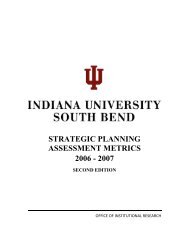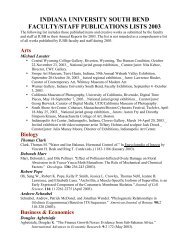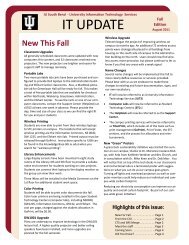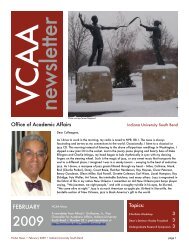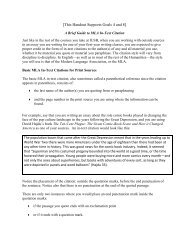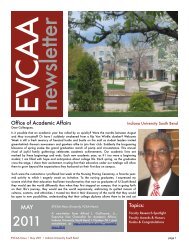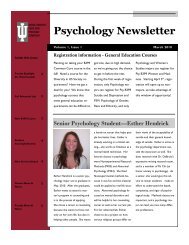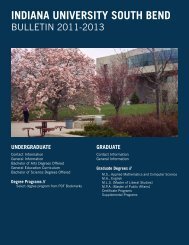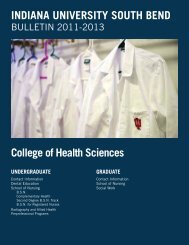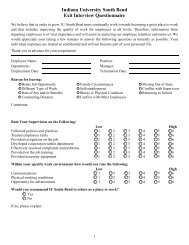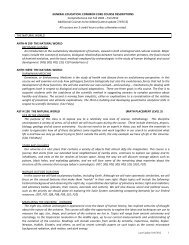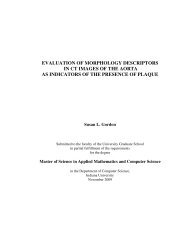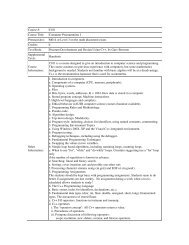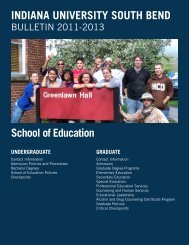Current version - Indiana University South Bend
Current version - Indiana University South Bend
Current version - Indiana University South Bend
You also want an ePaper? Increase the reach of your titles
YUMPU automatically turns print PDFs into web optimized ePapers that Google loves.
RADIOGRAPHY AND ALLIED HEALTH 4145<br />
Code of Ethics<br />
Students preparing to enter the profession of<br />
radiography are expected to follow the Code of Ethics for<br />
the Radiologic Technologist. Each person, upon entering<br />
the profession, inherits a measure of responsibility and<br />
trust in the profession and the corresponding obligation<br />
to adhere to standards of ethical practice and conduct set<br />
by the profession. The code was adopted by the American<br />
Society of Radiologic Technologists.<br />
It is the clinical/professional student’s responsibility to<br />
know, understand, and follow the Code of Ethics for the<br />
Radiologic Technologist.<br />
• The radiologic technologist conducts himself or herself<br />
in a professional manner, responds to patient needs,<br />
and supports colleagues and associates in providing<br />
quality patient care.<br />
• The radiologic technologist acts to advance the<br />
principle objective of the profession to provide<br />
services to humanity with full respect for the dignity<br />
of mankind.<br />
• The radiologic technologist delivers patient care and<br />
service unrestricted by concerns of personal attributes<br />
or the nature of the disease or illness, and without<br />
discrimination on the basis of sex, race, creed, religion,<br />
or socio-economic status.<br />
• The radiologic technologist practices technology<br />
founded upon theoretical knowledge and concepts,<br />
uses equipment and accessories consistent with the<br />
purpose for which they were designed, and employs<br />
procedures and techniques appropriately.<br />
• The radiologic technologist assesses situations;<br />
exercises care, discretion, and judgment; assumes<br />
responsibility for professional decisions; and acts in<br />
the best interest of the patient.<br />
• The radiologic technologist acts as an agent through<br />
observation and communication to obtain pertinent<br />
information for the physician to aid in the diagnosis<br />
and treatment of the patient and recognizes that<br />
interpretation and diagnosis are outside the scope of<br />
practice for the profession.<br />
• The radiologic technologist uses equipment and<br />
accessories; employs techniques and procedures;<br />
performs services in accordance with an accepted<br />
standard of practice; and demonstrates expertise in<br />
minimizing radiation exposure to the patient, self, and<br />
other members of the health care team.<br />
• The radiologic technologist respects confidences<br />
entrusted in the course of professional practice,<br />
respects that patient’s right to privacy, and reveals<br />
confidential information only as required by law or to<br />
protect the welfare of the individual or the community.<br />
• The radiologic technologist continually strives to<br />
improve knowledge and skills by participating in<br />
continuing education and professional activities,<br />
sharing knowledge with colleagues, and investigating<br />
new aspects of professional practice.<br />
Admission<br />
General Information<br />
Students may apply for admission to the Preradiography<br />
Program after qualifying for regular admission to <strong>Indiana</strong><br />
<strong>University</strong>. Upon acceptance to the program, students<br />
enrolled in general-education courses required for the<br />
Associate of Science degree are classified as preradiography.<br />
If students have a disability and need assistance, special<br />
arrangements can be made to accommodate most needs.<br />
For the hearing impaired, SPRINT provides services<br />
at (800) 743-3333. For more information, contact the<br />
program director.<br />
Admission to the Clinical/Professional Program is based<br />
upon each applicant’s admission grade point average<br />
(AGPA) of the completed preradiography generaleducation<br />
courses, a personal interview, and a rating<br />
point system. A maximum of 21 students are admitted<br />
each fall semester. Students must be certified by their<br />
academic advisor as eligible to apply for the Clinical/<br />
Professional Program and must submit a formal<br />
application for admission consideration by February 1 of<br />
the year of anticipated entry.<br />
Academic Standards<br />
Students enrolled in the Preradiography or Clinical/<br />
Professional Program are subject to academic standards<br />
as established by IU <strong>South</strong> <strong>Bend</strong>. Failure to maintain<br />
these standards could lead to academic probation or<br />
dismissal from the program. The standards are explained<br />
to students during their initial orientation/advising<br />
session.<br />
Specific Requirements<br />
In addition to admission policies and requirements<br />
found at the beginning of this publication, the following<br />
requirements apply to the Radiography Program.<br />
Preradiography Program<br />
Authorization for PHSL-P 261 Human<br />
Anatomy and Physiology 1<br />
To qualify for entry into PHSL-P 261 Human Anatomy and<br />
Physiology 1, all preradiography students must meet the<br />
following condition:<br />
• Within the last three years, have completed the IU<br />
<strong>South</strong> <strong>Bend</strong> PHSL-P 130 Human Biology course with a<br />
grade of C or higher<br />
If you have completed human anatomy and physiology<br />
at another college or IU system campus, or if you need<br />
additional information, contact the IU <strong>South</strong> <strong>Bend</strong><br />
radiography department by calling (574) 520-4504 to<br />
discuss the guidelines for transfer credit equivalency<br />
consideration. All transfer courses are evaluated by the<br />
IU <strong>South</strong> <strong>Bend</strong> biology and/or chemistry departments<br />
to ensure that course curriculum standards were met.



